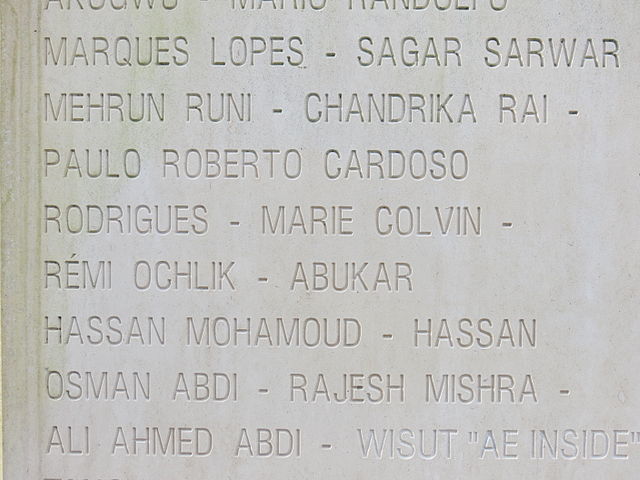Awarding Punitive Damages Against Foreign States Is Dangerous and Counterproductive
The U.S. District Court for the District of Columbia held recently that Syria is liable for the death of American war correspondent Marie Colvin and awarded Colvin’s family $302.5 million—$2.5 million in compensatory damages and $300 million in punitive damages. Colvin was killed in Syria when President Bashar Assad’s forces bombed the Baba Amr Media Center in Homs while she was in the facility.

Published by The Lawfare Institute
in Cooperation With

The U.S. District Court for the District of Columbia held recently that Syria is liable for the death of American war correspondent Marie Colvin and awarded Colvin’s family $302.5 million—$2.5 million in compensatory damages and $300 million in punitive damages. Colvin was killed in Syria when President Bashar Assad’s forces bombed the Baba Amr Media Center in Homs while she was in the facility. Judge Amy Berman Jackson found that the bombardment amounted to Syria’s engaging in extrajudicial killing and, therefore, the Syrian regime could and should be liable under the terrorism exception to the Foreign Sovereign Immunities Act, or FSIA, for Colvin’s wrongful death. But by holding Syria accountable in this way, Jackson has followed a dangerous precedent, which could result in the denial of compensation to victims of war crimes and other tortious acts and poses a threat to the peaceful international legal order.
Understanding the risks in Jackson’s award requires a better understanding of the exceptional circumstances under which states can be held liable. As a general rule, states cannot be subjected to each other’s jurisdiction without their consent. This familiar principle in international law is known as the state immunity doctrine, and it is an expression of states’ equal status and independence from one another as well as the need to maintain peaceful international relations. From 1812 through the mid-20th century, the state immunity doctrine was interpreted in accordance with the Supreme Court case Schooner Exchange v. McFaddon, in which Chief Justice John Marshall held that the doctrine grants foreign states absolute immunity from U.S. jurisdiction absent their implied or explicit consent. However, the absolute immunity approach was abandoned in 1952, when acting legal adviser to the State Department, Jack Tate, sent a letter (which became known as the “Tate Letter”) to the acting attorney general, in which he announced that the department would not be asserting immunity for friendly nations in matters arising from private or commercial activities. Thus, the U.S. adopted a restrictive interpretation of the state immunity doctrine.
Yet, it was not until 1976 that Congress formalized as statute this restrictive version of the state immunity doctrine in the FSIA. While the FSIA maintains that, ordinarily, individuals’ claims against foreign states in U.S. court are barred, it also echoes the Tate Letter’s position by codifying several exceptions to this immunity, including an exception in relation to commercial activities, property and torts. Jackson’s ruling relied on the terrorism exception (28 U.S.C. §1605A), which was added to the statute in 1996 and was later expanded by the National Defense Authorization Act for fiscal 2008 and the Justice Against Sponsors of Terrorism Act of 2016. According to the terrorism exception to the state immunity doctrine, states that sponsor an act of terrorism that results in injury or death do not receive immunity from monetary damages in U.S. courts. Acts of terrorism are defined as “torture, extrajudicial killing, aircraft sabotage, hostage taking, or the provision of material support or resources for such [acts]” and need not be committed by a terrorist organization. An act that is committed by “an official, employee, or agent of such foreign state while acting within the scope of his or her office, employment, or agency” will trigger the exception—hence, Jackson’s finding that the actions of the Syrian military, which resulted in Colvin’s death, abrogated immunity.
Indeed, over the years, several court rulings were made possible by the terrorism exception. For example, as of 2017, U.S. courts had held Iran alone liable for more than $46 billion in compensation. These phenomenal sums are the result of the courts awarding punitive as well as compensatory damages. Compensatory damages aim to provide a remedy for the loss an individual suffered; accordingly, their amount is linked to an assessment of the individual’s losses. Punitive damages have a different purpose, as they are intended to impose costs that punish and deter. Consequently, their calculation is not necessarily tied to an assessment of the loss a victim has suffered, and the amount of a punitive damages award can vary considerably based on the amount requested by the plaintiffs, the views of the judge and the feelings of the jury, with the potential of reaching an extraordinarily large award. For instance, in the Colvin case, $300 million of the $302.5 million award was punitive.
The path taken by the courts in awarding massive punitive damages against foreign states is a dangerous one for two main reasons. First, the amount of punitive damages may be so high that it obstructs the ability of individuals to enforce awards of compensation against foreign states within the United States. Thus, the resources that any single foreign state may have in the U.S. are more likely to be depleted before all or any victims are able to get their share, especially considering the scale of punitive damages often awarded and the fact that execution against assets of foreign states under FSIA is restricted, as Ingrid Wuerth has explained on Lawfare. Furthermore, any attempt to enforce the U.S. court rulings in other jurisdictions will be hampered, as new proceedings will be required in each foreign jurisdiction, and success is far from guaranteed. Hence, the award of punitive damages in these situations might offer justice only to those with the resources to pursue actions in those jurisdictions, while leaving the less fortunate with the judicial equivalent of an oversized novelty check.
A second, much more difficult issue that arises from decisions like Jackson’s is the risk that punitive damages against foreign states pose to the peaceful international order. As stated above, the goal of punitive damages is to punish the wrongdoer and deter individuals from engaging in wrongful conduct. To award punitive damages, a court must be in a position of authority over the defendant. This authority exists, for example, when U.S. courts issue an order of punitive damages against a U.S. national. However, when the defendant is a foreign state, U.S. courts ought to lack the relevant authority to punish another state through an order of punitive damages. Because all states enjoy equal status, no one state can be in a position of power over another. Hence, no one state can impose a unilateral punishment on another. Seeing this argument through means that the U.S. courts cannot order punitive damages against a foreign state because in doing so they will be asserting that the U.S. is in a position of power over the foreign state, which contradicts the principles of state sovereignty and undermines the status of the foreign state as a state. This argument may be the rationale behind Section 1606 of the FSIA, which holds that a foreign state cannot be held liable for punitive damages, though an agency or instrumentality of the state can be. Nevertheless, the terrorism exception overrides this provision, allowing courts to order “economic damages, solatium, pain and suffering, and punitive damages,” as well as to hold a foreign state vicariously liable for the acts of its officials, employees or agents. Therefore, the terrorism exception grants U.S. courts an authority they ought not to have, as having this authority positions the U.S. as a super-state with power over all other nations.
Thus, the threat that punitive damages pose to peaceful international relations is twofold. First, their potential size could result, if enforced, in foreign states experiencing financial crises that could even result in their collapse. Recent cases illustrate that this scenario is not a remote possibility: The outstanding damages award against the Iranian government in 2017—$46 billion—is about one-tenth of the World Bank’s estimate of that country’s gross domestic product for that year. Both scenarios can have a negative effect on the global economy more generally. Second, by holding that it is in a position to order punitive damages, the U.S. implies that it has superior status over other states. Adopting this approach can, in turn, undermine relations between the U.S. and foreign countries, as this position goes against the very basic principle that all states enjoy equal status as states.
In contrast, ordering a foreign state to pay compensatory damages for losses that arise from commercial activities and torts does not raise, or at least mitigates considerably, these difficulties, and courts should limit awards only to this type. Compensatory damages are meant to remedy the loss an individual suffered. Consequently, they are usually considerably smaller. Furthermore, an order of compensatory damages in relation to losses that arise in the context of commercial activities and torts does not challenge the equality of foreign states in the same way that punitive damages do. An award of this kind of damages and in this context not only is viewed by many countries as a legitimate and needed exception to the doctrine of state immunity but also is a common practice among nations (unlike an award of punitive damages, and the extraordinary scope of such awards in U.S. courts in particular). This practice is so established that it is possible to claim that there is implied consent of states to be subject to the jurisdiction of foreign courts when the injury is related to commercial activities and torts. Having such consent means that no one state is placing itself in a position of authority over another. Rather, there is mutual respect of states’ equal status. Hence, compensatory damages do not pose the same threat to peaceful international relations as punitive damages, and U.S. courts ought to suffice with awarding them. Ultimately, and considering what is at stake, perhaps Congress should once more embrace the spirit of the Tate Letter and amend the FSIA to completely disallow an order of punitive damages against foreign states.





